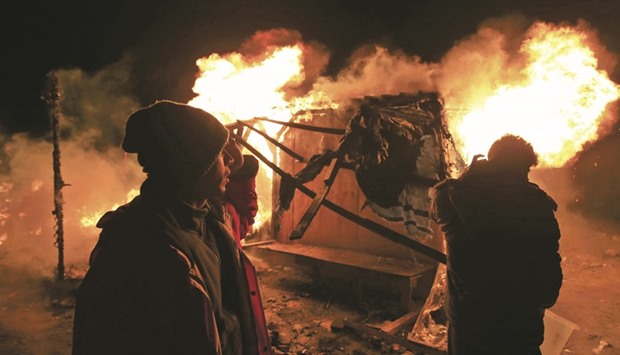France was razing parts of the “Jungle” migrant camp for a second day yesterday while thousands of migrants remained blocked in Greece as Europe struggled with the flood of desperate people at its borders.
An overnight downpour left stranded refugees shivering in the mud on the Greek border with Macedonia as the UN said more than 131,000 migrants had crossed the Mediterranean to reach Europe so far this year.
The figure was more than the total number for the first five months of 2015 as Europe grapples with its biggest migration crisis since World War II which many fear poses a threat to very core of the European project.
In the northern French port city of Calais, tensions were high as bulldozers continued dismantling the southern half of the Jungle camp, which has become a magnet for people hoping to reach Britain.
Roving teams were trying to convince the inhabitants to leave of their own volition and move to better accommodation provided for them, but many fear it will take them further from their goal of reaching Britain, with clashes erupting on Monday.
“We have already seen prison and torture, this doesn’t scare us,” a migrant told one of the teams.
While the Jungle has become a cause celebre for activists, the crisis there pales in comparison to the situation along the Greek-Macedonian border where more than 7,000 people are stranded after Balkans states imposed a daily limit on the number of migrants allowed to enter.
Increasingly desperate, some tried to force their way across the frontier on Monday but were tear-gassed by Macedonian police, prompting a sharp rebuke from the EU, which said it was “not our idea of managing the crisis”.
In a bid to ease some of the deep divisions which have emerged over the crisis, EU president Donald Tusk set off yesterday on a tour which will take him to Vienna, the Balkan states and Turkey.
At the Idomeni border camp in northern Greece, where thousands of refugees and are camped, an overnight downpour left their tents drenched and children coughing miserably.
With Austria and Balkan states capping the numbers of migrants entering their territory, there has been a swift build-up along the border in northern Greece, with Athens warning that the total number of people “trapped” on its soil could reach up to 70,000 in March.
“We have been waiting for six days,” said a Syrian woman called Farah as a van distributing canned food and long-life milk was quickly mobbed and emptied in minutes.
“The food is not enough, everyone is lying to us and we are desperate,” added the 32-year-old, as children could be heard coughing and crying in nearby tents.
German Chancellor Angela Merkel, whose country registered 1.1mn asylum-seekers in 2015, lashed out at the border restrictions, saying that they risked plunging debt-ridden Greece into refugee chaos.
UN rights chief Zeid Ra’ad Al Hussein denounced the growing border restrictions as “an act of cruelty”, saying that instead of receiving compassion, desperate refugees were facing a “rising roar of xenophobia”.
And Eva Cosse of Human Rights Watch said trapping asylum-seekers in Greece was “an unconscionable and short-sighted non-solution that is causing suffering and violence”.
Despite the criticism, countries in the firing line were standing firm.
“We cannot take in hundreds of thousands of people. We are not Germany’s waiting room,” Austrian Chancellor Werner Faymann told Heute daily newspaper. “It cannot be that people are just waved through Greece, Macedonia and Croatia and that Austria does the EU’s job of sharing them around.”
Back in northern France, operations to raze the southern half of the Calais camp were continuing, with officials saying that it would affect between 800 and 1,000 people, although charities working there say it would affect more than 3,450 people, among them 300 unaccompanied children.
The demolition comes ahead of talks tomorrow between French President Francois Hollande and British Prime Minister David Cameron.
The fate of the camp has also played into fraught discussions about Britain’s possible exit from the European Union (EU).

Migrants stand near a makeshift shelter set ablaze in protest against the partial dismantlement of the Calais camp for migrants called the ‘Jungle’.
